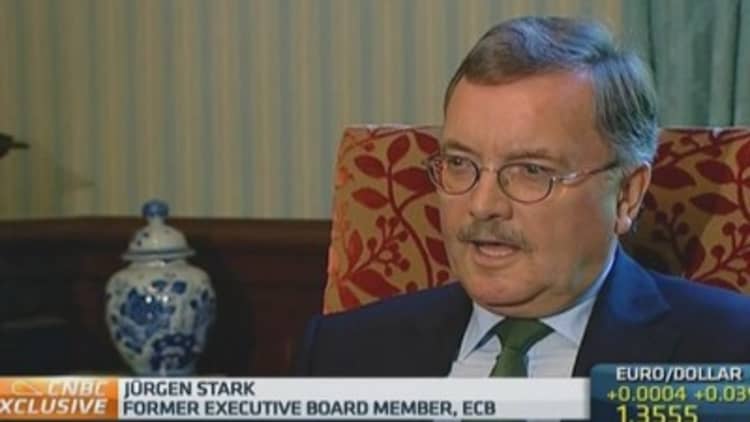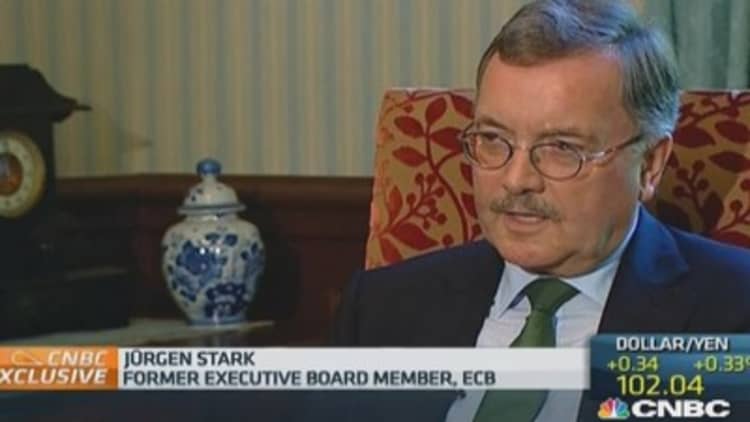
Consumer prices in the euro zone are stable rather than too low, former European Central Bank (ECB) board member Jürgen Stark said, countering a widely held view that the current low level of inflation could derail the economic recovery in the euro zone.
"I miss the term price stability…Low inflation and price stability will boost real disposable income and will help to foster private consumption. This is good news," Stark told CNBC in an interview.
Consumer prices rose by 0.5 percent year-on-year in May, according to official statistics released by Eurostat earlier this month. This marked a fall from April's 0.7 percent and is well below the ECB's target of inflation below of close to, but below 2 percent.
Read MoreWave of confidence boosting euro zone: Trichet
He said the International Monetary Fund, the Organisation of Economic Cooperation and Development and the ECB were all participating in a discussion about "too low" inflation which was "irrational". The decline of consumer prices index was mainly driven by decline in oil and commodity prices and was also a reflection of the ongoing adjustment of prices in the periphery. That adjustment was "urgently needed" he said.
"One can really understand and explain why the inflation rate is so low and…it is in my view not a threat," Stark said. "The discussion, all in all, in my view, is really irrational."
In the medium-term, inflation will move closer to 2 percent again, according to the German former governing council member.
Stark, a well-known "hawk", resigned in September 2011 amid disagreement over the central bank's purchase of government bonds to prop up troubled euro zone member states. Germany has repeatedly voiced concern that such purchases go beyond the ECB's mandate and are not part of its main task of safeguarding price stability.

He is still critical of the ECB's unprecedented efforts to stimulate the economy and has said in the past that the central bank seems to be the prisoner of its own actions.
The ECB last week introduced aggressive easing measures including cutting the deposit rate for banks from zero to -0.1 percent and the benchmark interest rate to 0.15 percent from 0.25 percent. It will also offer cheap long-term loans to banks worth up to 400 billion euros, and there may be more easing on the way.
"The ECB cannot exit from this policy. Otherwise the crisis would escalate again," Stark said. He believes that an escalation of the crisis is highly likely the ECB withdraws its "explicit guarantee" to help keep the interest rates on certain government bonds below key levels. "It is more or less trapped."
The bank's most recent action would not resolve the structural problems many countries in the euro area still face, he said, referring specifically to France and Italy.
Quantitative easing next?
ECB President Mario Draghi said in his last press conference that the bank was "not finished yet", suggesting further measures, which could include asset purchases or quantitative easing were on the way.
"This announcement is stronger than the announcement made in London two years ago of 'Whatever it takes', Stark said, adding that there was a real commitment, but only if it was absolutely necessary to fight deflation.
Many analysts have argued that Draghi's promise in 2012 to do "whatever it takes" was a turning point in the euro zone debt crisis and contributed to the return of confidence and growth.
But Stark was concerned that the ECB's current policy was encouraging market participants to take more risks, leading to asset price inflation.
"Market participants take more risk, expecting to be rescued in the case of a failure. And we see distortions already in many financial market segments."
Follow us on Twitter: @CNBCWorld


